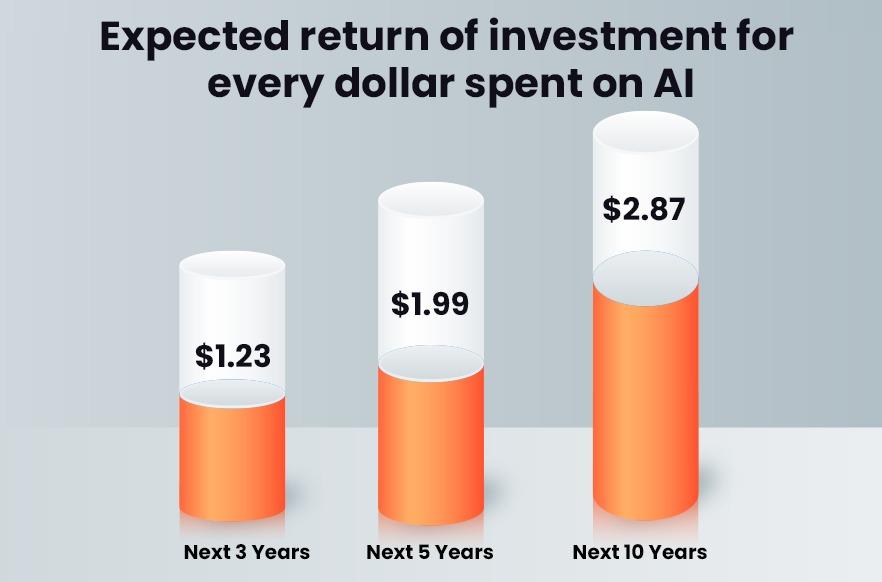
Every large company has invested in AI to dominate its markets. Big companies seem to have all the advantages, they have vast amounts of data (critical to AI), enormous investment capital and the capacity to hire talent. Does that mean SMEs have to throw up their hands in despair that they cannot compete? At iTech India, we have been integrating AI for business automation for large enterprises as well as smaller organizations. The difference is that smaller companies choose their battlegrounds more judiciously where they can gain a greater advantage and ROI.
Zendesk CX Trends Report 2022, 40% of small businesses surveyed said that they have the capacity to spend money on AI—but they do not.
There are a few workflows that are ideally suited for the automation of business processes for smaller enterprises. Most SMEs are focusing their AI efforts in these four areas: business operations, customer engagement, talent management and finance. Here is what some of the smaller companies are doing to incorporate AI, either by customizing their solutions or using existing tools.
Increasing productivity
One of the biggest hurdles for smaller businesses is the necessity to increase human resources to increase productivity. Most of the workforce though is deployed on repetitive and time-consuming tasks, the very mundaneness of which can increase errors and in turn have a domino effect down the line. This is where machine learning companies are helping SMEs in the automation of business processes and freeing up humans to focus on more specialized tasks.
Machine learning is a subset of AI with the capability of learning as it goes without being explicitly programmed. AI mimics human behavior but is superior to humans because it can analyze terabytes of big data in a fraction of a second and identify patterns that a human would probably take ages to accomplish. Artificial Intelligence in business solutions can then recommend actions that would help SMEs to capitalize on the opportunities identified.
Manufacturing firms particularly, both big and small, are finding that they cannot do without AI to optimize at least a part of the manufacturing process. Processes such as predictive maintenance that prevent sudden machinery downtime are having a positive effect on productivity.
However, small businesses can also utilize computer vision to detect defects in assets and this is more cost-effective than predictive analytics. Using automated optical inspection (AOI) through multiple cameras can process millions of data points to identify, dents, cracks, missing pieces or anomalies in machine behavior.
Inventory management and supply chain management are also gained by the involvement of AI for business processes. McKinsey predicts that companies can improve logistics costs by 15 percent, inventory levels by 35 percent and service levels by 65 percent compared to competitors who do not use AI solutions.
McKinsey predicts that ML will reduce supply chain forecasting errors by almost 50% with a minimum of 5-10% reduction in transport and warehousing costs.

Customer engagement
Artificial intelligence in business processes has the power to gather and analyze customer data in real time. No business can thrive without customers so this becomes a priority when it comes to AI for smaller organizations.
Customer relationships and loyalty are worth their weight in gold for smaller businesses. Understanding customer behavior based on data rather than on assumptions, is the key for smaller organizations to grow their customer base.
A decade ago, AI chatbots were very basic and a silly waste of investment. Today, virtual assistants are an invaluable tool in customer service processes. When well constructed, customers aren’t even aware that they are talking to an automated robot. The fact is that 80% of customer questions have been asked before and chatbots can seamlessly take over to provide quick responses to customers and pass on conversations to human agents when the scope is beyond their capability.
Through each interaction with a customer, AI chatbots are able to learn and build a pattern for each customer that will help in further interactions, delivering customer delight.
It is not just existing customers that AI chatbots can help with but when integrated into websites they can draw in potential customers and be involved in converting leads into ‘hot’ prospects. AI can help sales teams determine the most qualified leads so that closer attention is paid to them to improve close rates. Further, AI-powered solutions can even suggest the next-best actionable steps that can move prospects down the funnel. Of course, the caveat here is that there should be enough leads in the pipeline to make AI implementation worthwhile in the sales funnel.
AI in billing and invoice processing
In 2022, invoices are still being sent to customers in different formats such as XML documents, PDFs, image files and in very rare cases – hardcopy. Trying to feed all the data manually from different formats into a digital system is prone to error. This is why business automation is a need rather than an option for businesses wanting to streamline their billing and invoice processing workflows.
Industry data indicates that it takes a minimum of 25 days for a mid-size company to send out a bill and settle the invoice. Automating this process can reduce the time to 3-5 days.
It is not just time saved but there is a significant cost saving that is attached to automating finance processes. Manually processing invoices can cost up to 30 USD for each invoice on the accounts payable side and 4 USD on the accounts receivable side. By automating this process, there can be savings of up to 90%. Yet only 41% of companies have automated their financial processes – according to data from Statista.
Speak to our invoice processing automation experts at iTech India for proven and cost-friendly AI solutions.
Talent management
There are numerous AI tools that are helping small business owners with ready to deploy solutions. For SMEs, their employees are the most valuable assets, and here is where AI-backed human resource tools can help in the recruitment process. In fact, small businesses need not develop their own solutions but can subscribe to tools that they can integrate with their existing systems.
These AI algorithms can screen resumes and select CVs of candidates from external databases or from social media. In short, it can also do the headhunting that your HR team can spend hours doing.
to suit the position and culture of your company. In short, human element of recruitment is not replaced but AI rather speeds up hiring time and helps make smarter hiring decisions.
Still not sure if your business has the capacity for an AI overhaul? There are less expensive ways to go about automation. Contact our AI experts for a free chat on the best way to integrate artificial intelligence in business processes for your organization.







